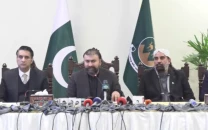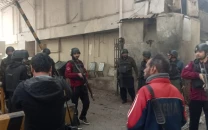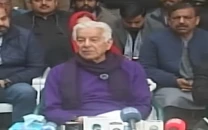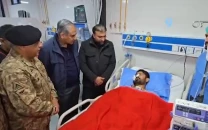Tribal areas woes: Political reforms sans freedom of expression meaningless
Civic society organisations demand repeal of ‘anti-human’ law.

Civil society representatives and media persons on Thursday described the recent amendments in the infamous Frontier Crimes Regulation (FCR) as ‘insufficient’ and called for repeal of the black law altogether.
They also demanded that tribal people should be given freedom of expression and access to justice and information.
They expressed these view at two separate functions held on political reforms and freedom of media.
A group of civil society representatives from different areas of Fata, including Waziristan, Mohmand and Orakzai agencies at a two-day meeting organised by Community Appraisal and Motivation Programme (CAMP), demanded the immediate repeal of the “Action in Aid of Civil Power Ordinance 2011 for Fata”.
They termed it an infringement on human rights and an obstacle to development in the war-torn areas.
They said they will not tolerate anyone to infringe upon their basic right to freedom of movement and access to justice.
They maintained that the ordinance has taken away whatever civil and human rights the people of Fata had. They proposed extension of Social Welfare Act to Fata.
“The ordinance authorises a military officer, irrespective of rank, to act as the witness and the jury for a person suspected of a criminal offence,” said Muhammad Wajid, a civil society representative from Mohmand Agency.
He said under the ordinance security forces are authorised to pick up anyone and detain him for 120 days for investigations without producing him before a magistrate.
Another civil society representative from Orakzai Agency, Nargis, said, “People are being tortured in custody and are not even being given the chance to defend themselves.”
Media reforms
Political reforms without freedom of expression and access to information is incomplete. The president of Pakistan needs to ensure this fundamental right there since he has the jurisdictional authority there.
This was the consensus of a roundtable discussion on “Can political reforms work without media reforms in FATA?” organized by Intermedia, a media development organization.
The participants criticised the apathy of government and different state institutions including the armed forces for not pursuing reforms related to freedom of information in FATA.
Representatives from Ministry of Information and Broadcasting, Pakistan Electronic Media Regulatory Authority (PEMRA), Pakistan Federal Union of Journalists (PFUJ), National Press Club (NPC), Educational Broadcasters Forum (EBF), several civil society organizations and think tanks and a large number of media representatives endorsed the need for urgent media reforms in FATA.
Nasir Ayaz, General Manager, Legal, Pakistan Electronic Media Regulatory Authority (PEMRA) told the participants that a request to implement Pemra laws in FATA was pending with the Ministry of States and Frontier Regions (Safron) for more than a year now.
Individuals belonging to FATA said that because of limited infrastructure, the only popular and affordable media in the tribal areas is the local radio.
“That is why the Taliban launched their own FM radio to propagate their ideology and extremist ideas,” said one of the participants adding that printing and distributing a newspaper or magazine is very difficult there.
The participants discussed three options to bridge the gap between fundamental rights and constitutional guarantees in order to bring freedom of expression and access to information reforms in FATA.
These options included introduction of an independent regulatory framework for media, extension of the existing laws including PEMRA law to the area and empowering FATA secretariat or provincial information department to grant licences to private media.
However, most participants altogether rejected the third option and said that extension of PEMRA jurisdiction to FATA, as done in the case of Azad Kashmir and Gilgit-Baltistan, seemed the quickest route for allowing an independent media in the tribal areas.
There was consensus among participants that the process of bringing a regulatory regime for allowing independent media, especially community radio stations, in FATA be expedited by the relevant authorities, culminating in quick approval by the presidency.
Published in The Express Tribune, November 25th, 2011.



















COMMENTS
Comments are moderated and generally will be posted if they are on-topic and not abusive.
For more information, please see our Comments FAQ